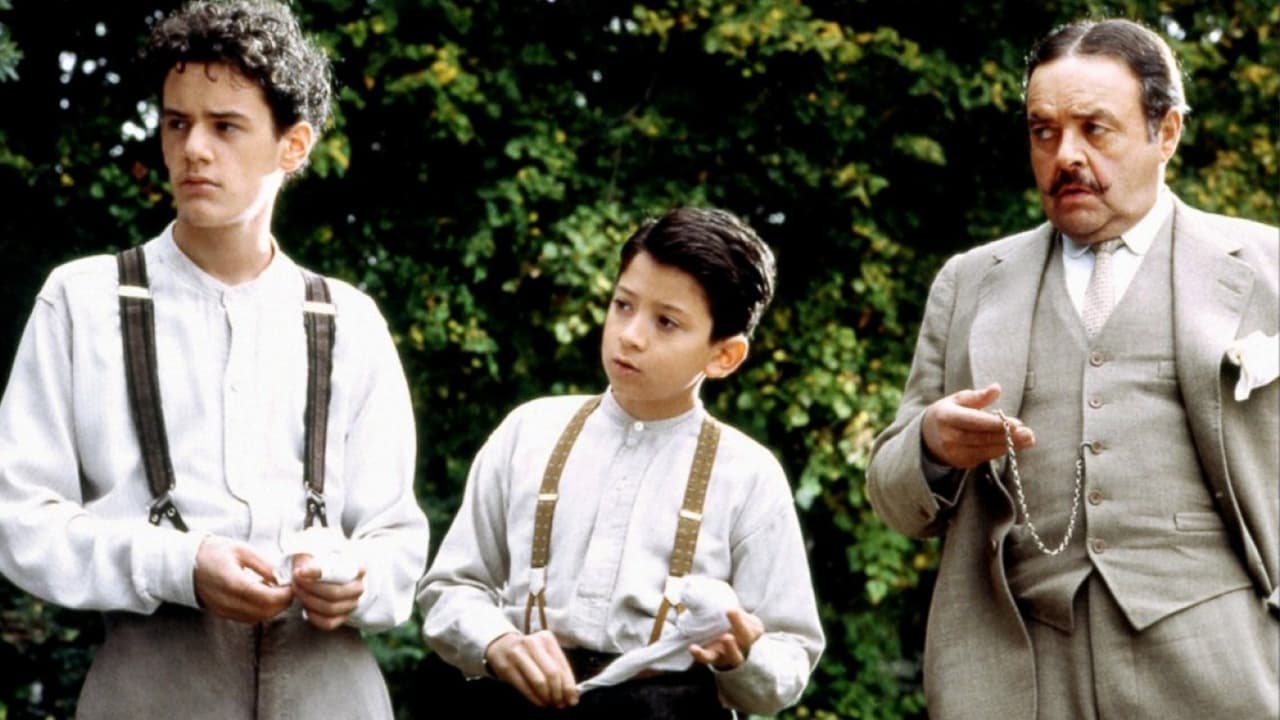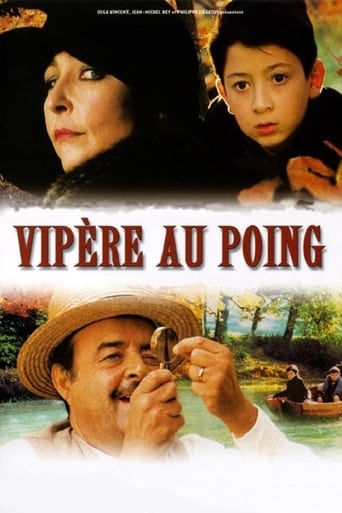

Although not generally a fan of turn-of-the-century reconstitutions, I admit to rather enjoying this film because of its plastic beauty, sets, dialogues and choice of actors. I am a great fan of both Jacques Villeret and Cathérine Frot, because they both have curious and instantly recognizeable faces as well as orally attractive accents when they speak. The film, a childhood biography illustrating the incomprehension between a mother and her children, comprises a fair number of scrumptious dialogues, comic situations, and well filmed sets. The theme music too is not unpleasant and blends in well with the events. The "voice-off" technique is used - for me this is very reassuring and puts me straight into the story - in cases where this technique is NOT used, I sometimes waste a certain amount of time around the beginning wondering exactly what is going on and asking questions about the identity of each character. Of course Cathérine Frot, such a nice lady in real life, gives a remarkable performance as a domineering, heartless and vicious mother, especially with her two older children. Jacques Villeret, softer and more gentler does provide her with some support but is not as radical as his ideas. There are comic situations in the film, especially where Jules Sitruk is telling off God for having let his grandma die and asking him not to make the same mistake again and let his mother die asap because he hates her. He also has a thing going about the quantity of chocolate he is nibbling while praying and how much God should be letting him eat. Technical details of the film show that it was in part filmed in the UK, purportedly in the Dorset area, although the novel is set in the Nantes area close to Brittany. Certainly worth a watch, available on DVD in France with French only subtitles, the film will appeal to those who like filmed Novels and period pieces from the beginning of the 20th century onwards.
... View MoreA good (but not great) adaptation of André Bazin's autobiographic novel which I urge all the users who saw the movie to read.Philippe de Broca does not feel at home in this gloomy story ,he who shines in comedies or adventures yarn ("Cartouche" "L'homme de Rio" ).And the made-for-TV version is imprinted in my memory as it must be in any French's.It had the definitive Folcoche (Folcoche= Folle Cochonne= Mad Swine):Alice Sapricht was so terrifying that any actress who would take on the part would be fatally compared to her.Catherine Frot does an okay job,but Folcoche was ,is and will always be Alice Sapricht whose ugliness worked wonders.On the other hand,I'm pleased to see that one of the late Villeret's last parts was worthwhile, a thousand miles from the obnoxious "Iznogood" .Good performances also come from English Cherie Lunghi ,Pszoniak and Paul Le Person.In the French literature ,"Vipère au Poing" recalls "Poil de Carotte".These two books feature the most terrifying mothers who ever were.And they were not invented.Both Bazin's and Jules Renard' moms were respectively Folcoche and Madame Lepic !
... View More... or Every Home Should Have One, with apologies to John Steinbeck whose short story had nothing whatsoever to do with the autobiography of Herve Bazin which is the basis for this fine film. Catherine Frot is cast against type as the mother from hell and at times, especially when shot in extreme close up she actually contrives to LOOK like a snake. If, as I did, you see Frot in Les Soeurs Fachees, within twenty four hours you can't help marveling at her range but more of that when I get to The Angry Sisters. In his formative years Bazin lived with his grandmother because his parents were in Indo China and the film kicks off as the grandmother does and the parents return to France to take care of their two sons. Frot's complete lack of maternal instinct has to be seen to be believed as do her Draconian measures - no heat in the boy's bedroom in winter is only the beginning. It's tempting and easy to think that Frot based her characterization on Margaret Thatcher, there is the same coldness, the same aloof autocracy and it was Thatcher, of course, in her role as Minister for Education who famously discontinued the free school milk that children had enjoyed for years, earning her the well-deserved sobriquet Thatcher The Milk Snatcher. Jacques Villeret, also cast against type offers sterling support as the milquetoast husband but it is young Jules Sitruk, so good in Monsieur Batignole, who weighs in with a wonderfully assured performance as the rebellious son. It's difficult to find fault with anything from the acting to the attention to detail in the period setting. One to see again.
... View MoreVipère au poing is a french novel telling the childhood of the author Hervé Bazin. As a young boy, Bazin was confronted with his mother who was a tyrant. She had imposed a very tough way of life in the family manor. For instance, during the winter, she had forbidden any heater in the bedrooms of her children. She was finally nicknamed by them "Follcoche" for Folle (mad) and Cochonne (pig). In 1971, a first film from the book had been shot for TV with Alice Sapritch playing the mother. At this time, the french viewers had been impressed by her acting.Thirty years later, there is this new adaptation by Philippe de Broca. If you forget Alice Sapritch and equally the book, you can be enjoyed by the movie. Admittedly, there are some flaws in the Broca film. You can discuss the acting or you can find the voice off unpleasant. But this film is nice, it's enjoyable to see it. And it is not boring at any moment. It's too rare in the french cinema nowadays, not to be underlined.
... View More